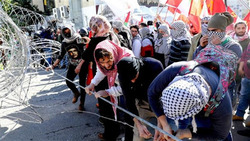 People in Lebanon have held a protest rally near the US embassy in capital Beirut to express their dissent against American President Donald Trump's Middle East plan, known as the so-called deal of the century, on Israeli-Palestinian conflict.
People in Lebanon have held a protest rally near the US embassy in capital Beirut to express their dissent against American President Donald Trump's Middle East plan, known as the so-called deal of the century, on Israeli-Palestinian conflict. RNA - On Sunday, protesters, both Palestinian refugees and Lebanese, chanted anti-US and anti-Israel slogans and waved flags near the US diplomatic mission in Beirut’s northeast district of Awkar. They tried to reach the embassy but were stopped as security forces blocked a road to the compound.
“The ‘deal of the century’ shall not pass,” read a huge banner in the colors of the Palestinian flag carried by protesters on Sunday, referring to the so-called peace plan.
A number of demonstrators even attempted to dismantle a razor-wire barrier.
A call to hold a protest rally circulating on social media in Lebanon branded the Trump’s scheme as “the deal of shame.”
Trump unveiled his self-proclaimed “deal of the century” during an event at the White House alongside Israeli Prime Minister Netanyahu in Washington on Tuesday.
All Palestinian groups have unanimously rejected the American president’s highly-provocative initiative that largely meets Israel’s demands in the decades-old conflict while creating a Palestinian state with limited control over its own security and borders.
It enshrines Jerusalem al-Quds as “Israel’s undivided capital” and allows the regime to annex settlements in the occupied West Bank and the Jordan Valley. The plan also denies the right of return of Palestinian refugees into their homeland, among other controversial terms.
The protest rally came a day after the Palestinian Authority (PA), led by Mahmoud Abbas, cut all ties with Washington and Tel Aviv, including those relating to security, after strongly rejecting Trump’s proposal.
Abbas announced the decision while in the Egyptian capital, Cairo, to address an emergency meeting of the Arab League, which also rejected the proposal, citing its unfairness to the Palestinian cause.
“I came here to defend my rights and those of my children as Palestinians,” said a Palestinian refugee living in Lebanon's Bekaa Valley, adding, “We will not accept handing over our land.”
According to a one-off census by the Lebanese government in 2017, some 174,000 Palestinian refugees live in 12 camps across the small Arab country.
The refugees began coming to Lebanon after Israel was forged in 1948, setting up camps, which gradually turned into bustling urban districts.
Palestinian refugees face tough living conditions and are barred from taking certain jobs.
“The right to return is an individual and collective right,” read another protest sign carried by protesters on Sunday.
Palestinians had already stopped recognizing any intermediary role by Washington in late 2017, when Trump recognized the holy city of Jerusalem al-Quds in the Tel Aviv-occupied West Bank as the Israeli “capital.”
Washington’s move, which triggered countless of protest rallies in the West Bank and the besieged Gaza Strip, came in the face of historic Palestinian demands that the city’s eastern part serve as the capital of their future state.
847/940